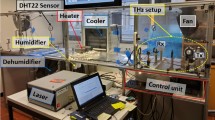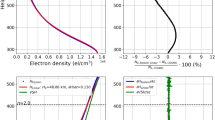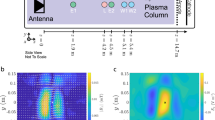Abstract
WE describe here an experiment in which the modulation radiated by a high frequency radio transmitter is transferred by an ionospheric process to waves of low and very low frequency (LF and VLF). This is the first observation of so called “cross modulation” for waves of frequencies below 167 kHz and this result has important implications regarding the electron energy and collision frequency in the lowest regions of the ionosphere.
This is a preview of subscription content, access via your institution
Access options
Subscribe to this journal
Receive 51 print issues and online access
$199.00 per year
only $3.90 per issue
Buy this article
- Purchase on Springer Link
- Instant access to full article PDF
Prices may be subject to local taxes which are calculated during checkout
Similar content being viewed by others
References
Utlaut, W. F., J. Geophys. Res., 75, 6402 (1970).
Phelps, A. V., J. Appl. Phys., 31, 1723 (1960).
Huxley, L. G. H., and Ratcliffe, J. A., Proc. IEE, 96, 433 (1949).
Deeks, D. G., Proc. Roy. Soc., A, 291, 413 (1966).
Author information
Authors and Affiliations
Rights and permissions
About this article
Cite this article
JONES, T., DAVIES, K. & WIEDER, B. Observations of D-Region Modifications at Low and Very Low Frequencies. Nature 238, 33–34 (1972). https://doi.org/10.1038/238033a0
Received:
Revised:
Issue Date:
DOI: https://doi.org/10.1038/238033a0
This article is cited by
Comments
By submitting a comment you agree to abide by our Terms and Community Guidelines. If you find something abusive or that does not comply with our terms or guidelines please flag it as inappropriate.



